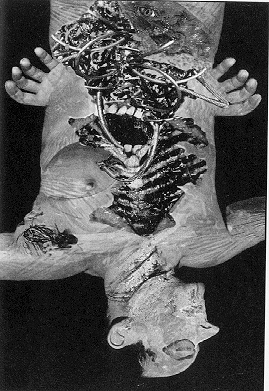How The Internet Changes the Way We Think :
Cyber versus Traditional Rhetoric
Professor Evergreen Keefer


How has cyberspace turned our thoughts upside down?
What happens to traditional rhetoric on web sites-- what are the new elements
of persuasion?
What has hypertext done to our narrative structure?
How is global communication condensed into The Box?
What are the advantages and disadvantages of online education?
What happens to the organic professor tangled in the inorganic internet?
What does online communication due to our minds, our bodies and our communities?
Links: Technical
Writing and the Internet
The Journal of
Online Education
The Brain Gym
Argumentation
Home Page
Required Reading
ARISTOTLE'S RHETORIC versus DATA
SMOG by David Shenk
THE WIRED PROFESSOR by
Joseph Hargitai and Anne Keating versus THE END OF EDUCATION by Neil
Postman
THE GUTENBERG ELEGIES: THE FATE OF READING IN AN ELECTRONIC AGE by
Sven Birkerts versus CHILDREN OF CHAOS by Douglas Rushkoff
Optional Reading
HAMLET ON THE HOLODECK by
Janet Murray (Literature/Creative Writing)
GLOBAL COMMUNICATION IN TRANSITION by Hamid Mowlana (International
Studies)
NEUROMANCER by William Gibson (A sci-fi
novel)
ONLINE: A REFERENCE MANUAL
READINGS by Sven Birkerts
FROM ORALITY TO LITERACY: THE TECHNOLOGIZING OF THE WORD by Walter
Ong
UNDERSTANDING MEDIA by Marshall McLuhan
CLICKING IN by Lynn Hershman-Leeson
These are class readings. You must develop a
3-page bibliography related to your own research.
Course Objectives:
To improve research skills and methodology in
the library, the lab and the community
To learn the style and format of an academic research paper and write at least
15 pages with a 3 page bibliography
To connect formal academic writing with a creative webfolio on the same subject
To explore the course theme of How the Internet Changes the Way We Think,
using class readings to deepen insights and connect research projects and
the Cyberperformance to improve rhetorical skills and enhance internet literacy.
GRADING
To get an A:
You must come to every class ON TIME with a weekly writing assignment, do an excellent midterm (5-8 pages) and an excellent final paper (15 pages) with a creative webfolio and oral presentation for the cyberperformance.
COURSE BREAKDOWN
Bring 2 or 3 pages of writing on your topic to every class!
May 18: Diagnostic. Interview class for ideas about how students' interests relate to class theme. Surf the net for research ideas. Read DATA SMOG for next week and write at least 2 pages on it. Introduction to Aristotle's Rhetoric.
May 25: In-class writing: "Think about your project and who would oppose it the most. What are you trying to persuade these enemies to do? What is your persuasive or rhetorical goal?" Introduction to web site. Write a paper on class readings as they relate to your area of research. Discussion of logical fallacies. Submit a proposal for research project. Read ARISTOTLE'S RHETORIC (what is pertinent to your work and understanding) and relate it to your line of argumentation in your project.
June 1: Discussion of proposals, in-class writing. Analyze the following statements in terms of your final paper: "All media as extensions of ourselves serve to provide new transforming vision and awareness," or "Our various improvements not only mark a diminution of the function improved upon but they also work to dissolve some of the fundamental authority of the human itself. We are experiencing the gradual but steady erosion of the species itself." or "If television is religion in the U.S. or Europe, in Iran it is religion that provides television." Refining thesis, sharpening definitions, and developing argumentation. For next week, you should have at least 6 pages on your paper. Submit an outline, a bibliography, a list of definitions and categories, thesis and anti-thesis. Read THE END OF EDUCATION and compare it with THE WIRED PROFESSOR. Review THE WIRED PROFESSOR and submit a web page on your topic in preparation for the cyberperformance.
Principles from THE END OF EDUCATION by Neil Postman:
1. All technological change is a Faustian bargain. For every advantage a new technology offers, there is always a corresponding disadvantage.
2. The advantages and disadvantages of new technologies are never distributed evenly among the population. This means that every new technology benefits some and harms others.
3. Embedded in every technology there is a powerful idea, sometimes two or three powerful ideas. Like language itself, a technology predisposes us to favor and value certain perspectives and accomplishments and to subordinate others. Every technology has a philosophy, which is given expression in how the technology makes people use their minds, in what it makes us do with our bodies, in how it codifies the world, in which of our senses it amplifies, in which of our emotional and intellectual tendencies it disregards.
4. A new technology usually makes war against an old technology. It competes with it for time, attention, money, prestige, and a "worldview."
5. Technological change is not additive; it is ecological. A new technology does not merely add something; it changes everything.
6. Because of the symbolic forms in which information is encoded, different technologies have different intellectual and emotional biases.
7. Because of the accessibility and speed of their information, different technologies have different political biases.
8. Because of their physical form, different technologies have different sensory biases.
9. Because of the conditions in which we attend to them, different technologies have different social biases.
10. Because of their technical and economic structure, different technologies have different content biases.
THE WIRED PROFESSOR by Hargitai and Keating
"Margaret Mead observed in Culture and Commitment that there were three cultural systems that could be defined in terms of who was learning from whom. In post-figurative cultures, or what we think of as the traditional educational model, children learned from their parents. In co-figurative cultures, children and parents learned from their peers. In pre-figurative cultures, parents learned from their children. We are now entering a pre-figurative phase, 'when a father can go up to his son and ask how does this computer work.'" (218)
Think of this quote when you compare CHILDREN OF CHAOS with THE GUTENBERG ELEGIES.
June 8: Meet at Ireland House at 6:30 for departmental writing event. Mandatory attendance. Submit education assignments (see above) for next week.
June 15: In-class writing (on above quote), progress reports, discussion and debate. Review of documentation style. Read CHILDREN OF CHAOS and THE GUTENBERG ELEGIES and write at least 2 pages on them for next week as well as 2 pages related to your topic.
June 22: In-class writing, progress reports, discussion and debate. Problem solving to develop original research.Trip to library? Prepare midterm.
June 29: Bring in three copies of Midterm: 5-8 pages of academic expository writing with a full page of APA or MLA style bibliography. Parenthetical documentation. The midterm should include the research proposal for the final project even if you haven't started it yet.
July 6: Individual conferences. Proposed changes for final. 3 page bibliography due.
July 13: Outline of final draft due. Oral presentations.
July 20: Oral presentations. Trouble shooting. Developing thesis and refining style.
July 27: Rough draft of final due. Oral presentations. Bring 5 copies for cross editing.
August 3: Final Papers due. No incompletes.